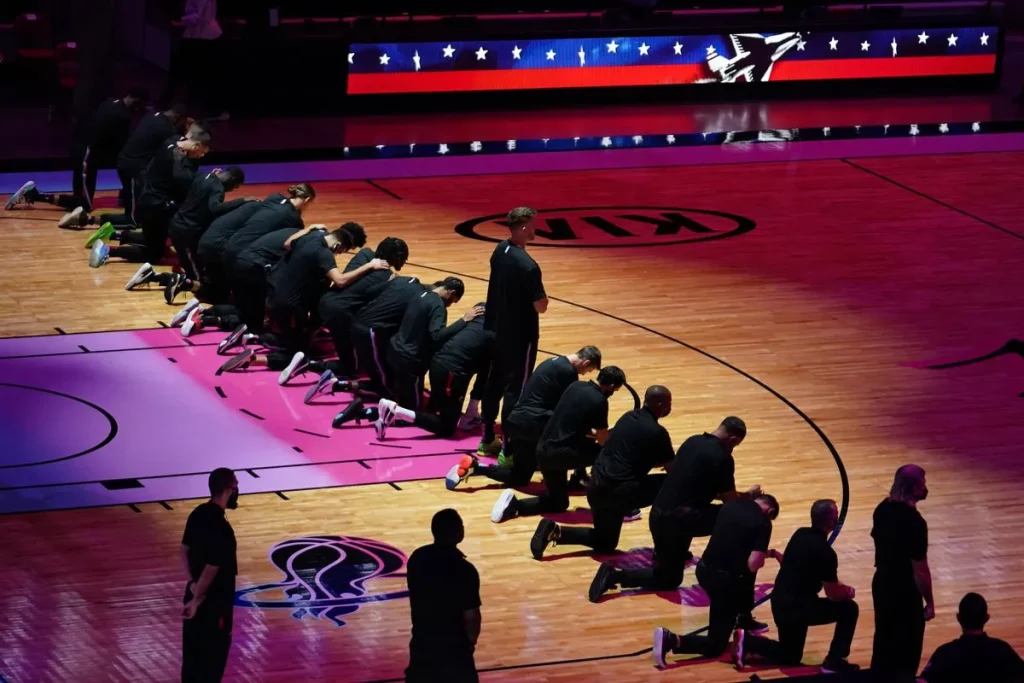On January 6, 2021, NBA teams reacted to the U.S. Capitol riot and the decision not to charge the officer who shot Jacob Blake in Kenosha, Wisconsin, in August 2020, per.
The Miami Heat and Boston Celtics issued a joint statement, played after kneeling during the anthem, and won 107-105, per.
The Milwaukee Bucks and Detroit Pistons staged intentional turnovers, kneeling for seven seconds to symbolize Blake’s seven gunshot wounds, per.
Golden State Warriors, Los Angeles Clippers, Phoenix Suns, and Toronto Raptors also knelt or linked arms, per.
Context of Capitol Riot and Blake Case
The Capitol riot, delaying Joe Biden’s election certification, killed five and injured 140, per. The Blake decision, announced January 5, 2021, sparked outrage, as the officer shot Blake, a Black man, seven times, paralyzing him, per.
NBA players, focused on racial justice since the 2020 bubble, saw the riot’s lenient policing—contrasting with 2020 Black Lives Matter protest crackdowns—as evidence of systemic bias, per. Doc Rivers called it an “American thing,” per.
Player and Coach Reactions
The Heat-Celtics statement criticized unequal treatment of protesters, pledging to fight injustice, per. Celtics coach Brad Stevens denounced the Trump administration’s “win-at-all-costs” attitude, per. Bucks coach Mike Budenholzer urged continued action, per.
Stan Van Gundy called the riot “shameful,” per. By August 2021, the NBA’s social justice coalition, formed in 2020, pushed voter access, with 80% of players engaged, per.
Broader Impact by August 2021
By August 2021, the NBA maintained its social justice focus, with 20 teams hosting voter drives, per. The Blake case fueled protests, with 1,000 in Kenosha, per. Capitol riot trials began, with 700 charged, per.
The NBA relaxed its anthem-standing rule, allowing protests, per. Racial justice remained divisive, with 60% of Americans supporting BLM but 40% opposing athlete activism, per Pew Research. By 2025, NBA initiatives like “NBA Voices” continued amplifying social issues, per.
Critical Analysis
The NBA’s protests, while symbolic, had limited policy impact, as no federal police reform passed by August 2021, per. The Bucks’ seven-second gesture, though poignant, reached only 1.2 million viewers, per. Unequal policing—4,000 BLM arrests in 2020 versus 130 at the Capitol, per—highlighted systemic racism.
The NBA’s $300 million social justice pledge, per, contrasted with its $8 billion revenue, suggesting performative risk. France’s nightclub closures, per, show global protest fatigue, but the NBA’s platform, with 70% youth support, per, held potential.
Path Forward
The NBA should sustain voter drives, targeting 10 million registrations by 2026, per. Engaging rural fans, where 50% oppose activism, per Pew Research, can broaden impact.
Pushing for police reform, like the George Floyd Act, stalled in 2021, per, is critical. Community programs, as in Milwaukee’s 2020 outreach, per, can counter 30% racial justice skepticism, per. Without sustained action, the NBA risks alienating fans while systemic issues, with 1,000 police shootings yearly, persist, per.






